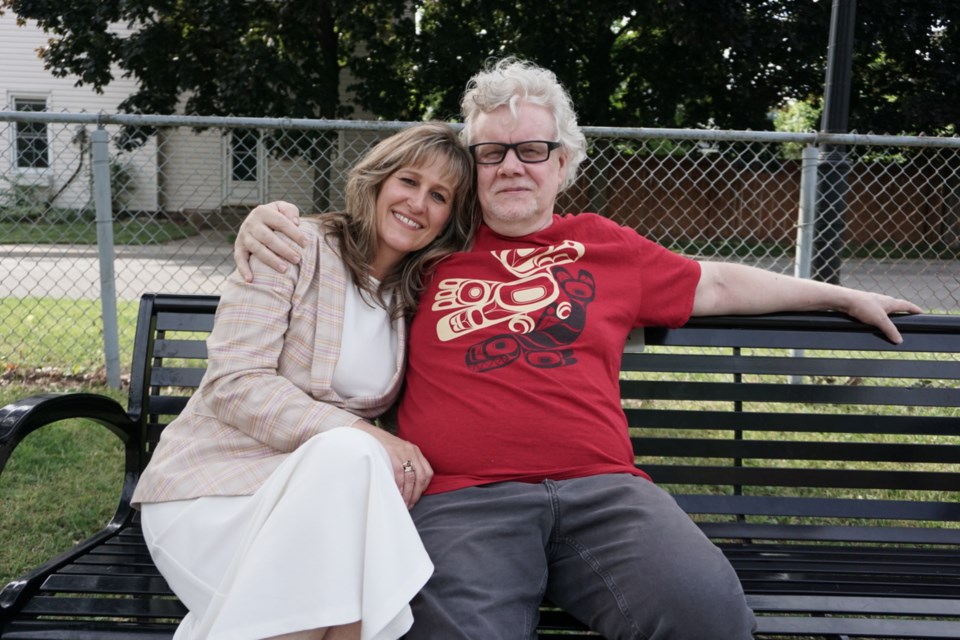When Pete Ward got a standard eye exam in October, it kicked off a chain reaction of tests and exams that led to a prostate cancer diagnosis.
Ward, who has been married to Burlington Mayor Marianne Meed Ward for 30 years, finished a daily, five-week-long round of radiation treatment at Juravinski Cancer Centre last week, but there was virtually no warning that anything was wrong.
“This happened just a day before my 60th birthday,” Ward said. “I had my very first prostate-specific antigen (PSA) test for prostate cancer when I was approaching 60. I should have had the test in the previous 10 years, but that was not a conversation I had with my doctor.”
From the initial eye test, doctors could tell Ward’s blood sugars were slightly off, so he was referred to do other tests at a cost of $35. The couple added that the follow-up was not insisted upon, but Ward took the test.
Last October our world was turned upside down with a diagnosis of cancer. But today is full of hope and gratefulness for our future. My beautiful husband Pete had the last of five weeks of radiation therapy and we celebrated by ringing the bell. The treatment is working and our… pic.twitter.com/fGVMhrhjBg
— Marianne Meed Ward (@MariannMeedWard) June 18, 2024
The two were fine to pay the fee, but now worry that there are others who may avoid a test that requires them to pay out of pocket.
“If you have a father, and a grandfather, you need to start testing to get a baseline in your 40s,” Meed Ward said. “And for heaven’s sake, can we make it free for men? I think of the difference for myself, when I turned 50, I got a lovely letter from the Ontario government telling me to get a mammogram, and we’re told to do that two years – and it’s free.”
Meed Ward’s own father battled prostate cancer for 20 years, before it spread to his bones.
Ward works for the Guelph-based organization Blue North, which helps non-profits raise money. Clients include Hamilton Health Sciences – which Juravinski is part of – Prostate Cancer Canada, Princess Margaret Cancer Foundation, and the Canadian Cancer Society.
When he was diagnosed, he was very aware of the statistics around various forms of cancers, and the language that people use when discussing it.
“The thing I underestimated was the emotional impact,” Ward said. “That was the thing I didn’t fully appreciate. Those words that I helped craft in terms of how we talk about what people are experiencing, and how donors can provide support and make a difference, it’s all very real now.”
Following the diagnosis, the two kept the information private, only going public a few days ago. Close family members, including the couple’s three kids, knew shortly after the diagnosis and have been supporting Ward in their own ways.
“They were very supportive, we talked about it, and said this is something we’re figuring out, and they accepted what we had to say at face value,” Ward said. “Obviously they had concern for me, but they weren’t overly anxious about it.”
Meed Ward added the diagnosis was like a punch in the gut, saying she was in disbelief, and that her world changed in a second.
Though Meed Ward is among the most public people in Burlington, Ward is more of an introvert, he said. Finding a balance between the two personalities was key for the two to support each other.
“You know who your trusted immediate family is, they are first to know outside of the kids,” Meed Ward said. “I told my staff, but they knew this is private. If there was a doctor’s appointment, they knew I was going with him. Everything scheduled for today is done, send apologies to the world. I needed them to be those gatekeepers.”
Meed Ward added that it's odd to keep something so private as a very public person, but it was a decision the two made together – as was the decision to go public.
“You have to see it at least a bit in the rear-view mirror before you’re able to share it more publicly,” Meed Ward said.
The couple is sending out what they call a PSA for a PSA, amplifying Canadian rocker Rik Emmett of Triumph, who also finished radiation treatment for prostate cancer in February.
I just finished my radiation today and got to ring the bell. For those who might not have been aware, I had a bout with prostate cancer. For you gentlemen out there north of age 45-50, please do yourself a favor and get checked. Consider this a PSA to get your PSA checked! pic.twitter.com/wYEK0os6mN
— Rik Emmett (@rikemmett) February 5, 2024
“We dodged a bullet by luck and happenstance,” Ward said. “Anything we can do to help others make different decisions. And we’d love for our governments to actually fund this. This should not be something people need to pay for, because that becomes a deterrent. That’s unacceptable.”
Things are looking good for Ward now, and he will require another prostate-specific antigen test in September to check his numbers, and the hope is they will be undetectable. He took another test midway through radiation, and his numbers had dropped to nearly zero.
